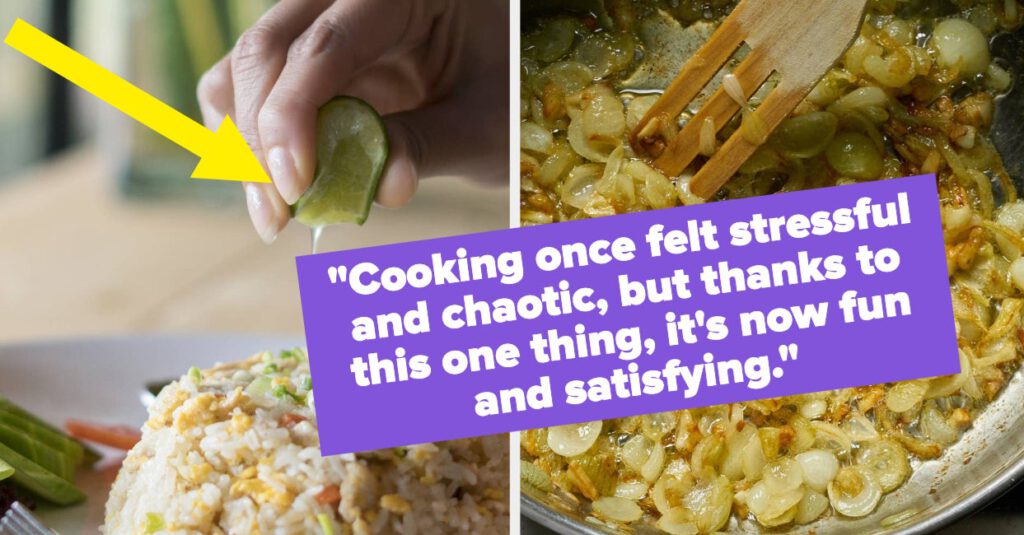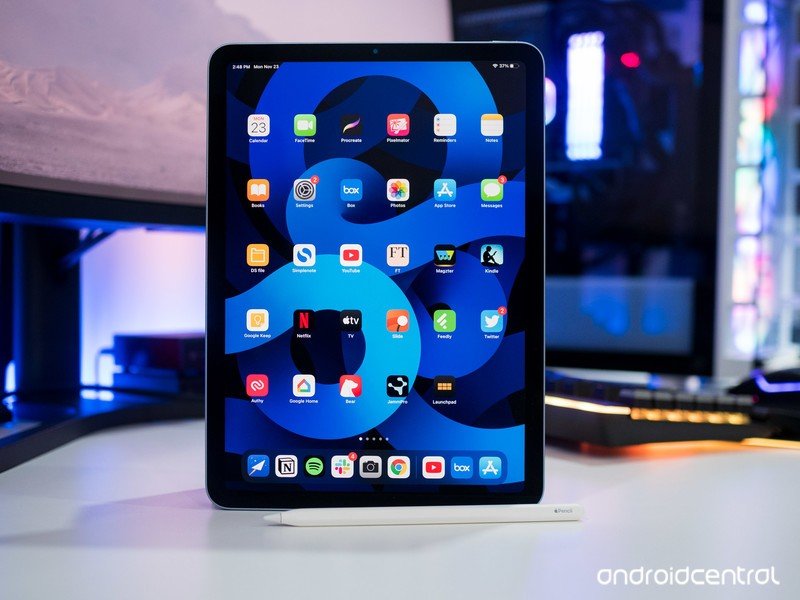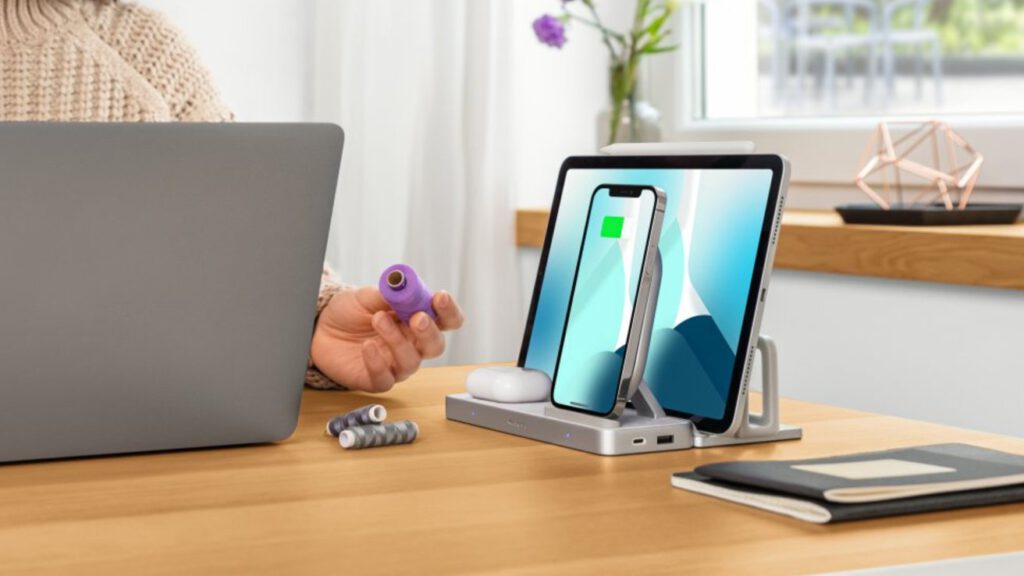Just like painting or playing the piano, cooking is both a hobby and a skill, and you’re constantly learning new tips, techniques, and pointers to hone your ability. And every once in a while, something just clicks. So Redditor u/Pieterbr asked, “What was your game-changer in cooking?” Here’s what people said.
1.
“Learning and getting to know your stove and oven. It’s not a lie when they say every single one is different.”
2.
“Mise en place. Having my ingredients chopped, diced, measured, and ready to go changed cooking from feeling stressful and chaotic to fun and satisfying.”
3.
“Learning how to control the level of salt and acidity in a dish. The right balance makes just about anything taste better. You can add salt with a few mashed anchovy filets or a bit of soy sauce. These ingredients also give a dish some umami that regular salt doesn’t provide. For acidity, lemon is the star for me, followed by sherry or cider vinegar. Acidity balances out salt and also brightens up heavy dishes. For instance I always add a bit of lemon juice to my roast chicken pan gravy.”
4.
“Always searing your meat first before adding it to soup or stew. This was my grandmother’s cooking advice, and I’ve never forgotten it.”
5.
“Parchment paper. Cooking chicken breasts, bone-in, wrapped tightly in parchment paper is the technique that made me realize I can cook. Parchment paper helps create the juiciest chicken ever, and it’s almost impossible to overcook. This technique is great for cooking fish too.”
6.
“Investing in a digital meat thermometer. It taught me that I should always cook to the right temperature and not necessarily to a certain time.”
7.
“Getting my sharp knives properly resharpened frequently, though it makes it harder to cook elsewhere when I don’t have access to my knives.”
8.
“Learning how to make medium-rare steak. I grew up in a home where steak was always cooked to well-done so I didn’t know any better. In fact, I didn’t even know you could cook steak differently. The first time I ordered steak as a young adult. I was caught off guard when the waiter asked how I wanted it. I just copied my friend at the table and ordered it medium-rare. I was afraid it was undercooked, but my friend reassured me it was OK. It changed my life.”
9.
“My silicone spatula. It’s my absolute favorite item in the kitchen. It’s especially useful for stir frying, scrambling/flipping eggs, scraping down the cake batter or cookie dough bowl, and more. The possibilities are endless.”
10.
“Growing my own herbs. Having access to fresh herbs for cooking all the time is such a game changer.”
11.
“A food processor. It might sound lazy, but since getting a food processor I can’t live without it. When I need to chop up an onion for spaghetti sauce, it takes 30 seconds (and doesn’t make me cry). If I need to shred a block of cheese for lasagna, my arms don’t get sore from grating and I can get every last bit of cheese without grating my fingers. When I need thin discs of eggplant for ratatouille, the food processor does it easily and perfectly uniform.”
12.
“Watching cooking videos on YouTube. Being able to watch different cooking techniques and recipes is far more descriptive and helpful for me than just reading a cookbook or any written word.”
13.
“Buying a microplane. So many dishes can be elevated by a quick dash of lemon zest. It’s super useful for hard cheeses, nutmeg, ginger, and garlic as well.”
14.
“Sautéing spices with your onions and garlic. I always thought spices like turmeric and masala should be treated like salt and pepper — sprinkled a bit here and there for flavor. But turns out, these spices need to be fried (aka bloomed) to really bring out the flavor.”
15.
“Salt your meat the day before you cook it. This gives salt the time to penetrate the meat and add flavor throughout. Salt also removes excess moisture, which helps the crisping/browning process.”
16.
“Season each ingredient, and add salt at multiple times during the cooking process instead of adding it all at the end.”
17.
“Slicing and freezing green onions. They don’t lose any of their good onion flavor and I always have them on hand. It makes whipping up fried rice even that much easier.”
18.
“More for baking than cooking, but investing in a kitchen scale was huge for me. It is easier, faster, more precise, and results in much less cleanup that using measuring cups and spoons.”
19.
“Learning how to manage and take advantage of fond. Fond — the caramelized bits at the bottom of your pan when you’re done cooking — is magical stuff, but there’s a fine line between amazing and burnt fond. I’ve learned you shouldn’t be afraid to deglaze early if it means protecting that precious flavor from burning.”
20.
“Learning to test flavors. If you’re not sure if a dish needs more salt, vinegar, hot sauce, sugar, soy sauce, etc… place a little of your food into a bowl and season it with what you think is missing. Does it taste better? If yes, season the whole batch. If not, try again. There’s no risk of ruining the whole batch if you just do a little side experiment first.”
21.
“Keeping multiple vinegars on hand. They are a godsend and are all so useful in different ways. I always have apple cider vinegar, red wine vinegar, rice wine vinegar, and white vinegar for cleaning.”
22.
“Cook pasta in a small amount of water so the water gets more starchy. Then, rather than drain the pasta, use tongs to transfer it over into a pan of sauce. Add a ladle or so of the pasta water to the pasta and sauce and cook it down a bit. I was always mystified by the idea of adding pasta water to the sauce. Turns out it makes a noticeable (and delicious) difference in the consistency.”
23.
“Starting to cook with MSG. After spending my whole life believing the negative stories about MSG, I started using a pinch of it in my cooking. Wow, it was like fireworks going off in my mouth. It just makes the flavors become so much more noticeable. I’ve been using it in most of my homemade dishes ever since.”
24.
“Understanding how to effectively utilize heat in a pan. In other words, knowing when to go full afterburner for searing, how long to heat the pan (and at what setting) before cooking, and realizing when you can just turn off the stove and let residual heat in the pan take you the rest of the way. There’s a ton of nuance to the relatively simple act of heating up a pan that you learn by experience over the years.”
25.
“Not only reading the whole recipe through before you begin cooking, but also reading the comments if it’s an online recipe. This way you can see what went wrong for other people (or helpful tips for making it better), and you can adjust accordingly.”
26.
“Cleaning as I go. I’ve tried to teach this lesson to my kids as well. It removes a lot of the mentality that cooking is a hassle and makes it more enjoyable.”
27.
“Learning techniques instead of specific recipes. I used to think cooking was finding a recipe, going to the store to buy ingredients, then following the recipe to make the dish. While sometimes that’s perfectly fine, doing it day-to-day ends up being cumbersome, boring, and restrictive. For me it’s become way more practical to look in the fridge, see what I have on hand, and apply a fitting technique to it: stir fry, sauté, soup, fried rice, stew, roast, etc…”
28.
“When it comes to cooking with spice: see it, smell it, taste it. Almost everyone starts out by not adding enough spices. You have to add enough to see the spices in the dish and smell them in the dish, which finally leads to you tasting them in the dish. Ever since learning this, I have greatly increased how much spice I add to a dish and the flavor is always so much better.”
What’s the biggest game-changer that has elevated your home cooking? Tell us in the comments.




